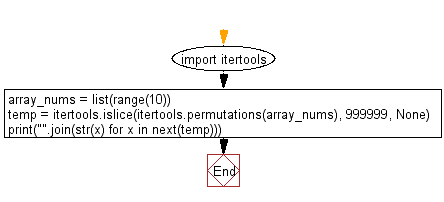Python Challenges: Find the millionth lexicographic permutation of the digits
Write a Python program to find the millionth lexicographic permutation of the digits 0, 1, 2, 3, 4, 5, 6, 7, 8 and 9.
In mathematics, permutation is the act of arranging the members of a set into a sequence or order, or, if the set is already ordered, rearranging (reordering) its elements—a process called permuting. For example, 3124 is one possible permutation of the digits 1, 2, 3 and 4. If all of the permutations are listed numerically or alphabetically, we call it lexicographic order. The lexicographic permutations of 0, 1 and 2 are: 012 021 102 120 201 210
Sample Solution:
Python Code:
import itertools
array_nums = list(range(10))
temp = itertools.islice(itertools.permutations(array_nums), 999999, None)
print("".join(str(x) for x in next(temp)))
Sample Output:
2783915460
Flowchart:

Python Code Editor:
Contribute your code and comments through Disqus.
Previous: Write a Python program to find the sum of all the positive integers which cannot be written as the sum of two abundant numbers.
Next: Write a Python program to find the index of the first term in the Fibonacci sequence to contain 500 digits.
What is the difficulty level of this exercise?
Test your Programming skills with w3resource's quiz.
